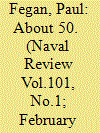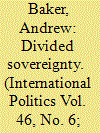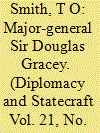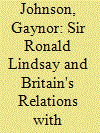| Srl | Item |
| 1 |
ID:
128568


|
|
|
|
|
| Publication |
2013.
|
| Summary/Abstract |
In a series of articles, the author takes a look at cuts, cost and affordability in order to speculate about what could have been and what might be.
|
|
|
|
|
|
|
|
|
|
|
|
|
|
|
|
| 2 |
ID:
120279


|
|
|
| 3 |
ID:
091435


|
|
|
|
|
| Publication |
2009.
|
| Summary/Abstract |
Great Britain is regarded as a classic example of the Weberian state, and thus as a model of a developed state that might be contrasted with developing states. However, this view conceals the formative role of empire in the evolution of the British state. Rather than take the distinction between a 'metropolis' and a 'periphery' as given, this article explores the mutual constitution of state and empire. What it finds is that the political identity of the British state changed dramatically during the first half of the twentieth century as British intellectuals and policy-makers attempted to develop a new political community, primarily through the vehicle of the Commonwealth. The British state of the interwar years decentralised its decision making and embedded itself firmly in new multilateral networks. A rationalised, centralised British state emerged after the Second World War and only then within a context of multiple (principally Atlantic and European) political identities. The modern British state is as much a post-colonial invention as are states of the 'developing' world.
|
|
|
|
|
|
|
|
|
|
|
|
|
|
|
|
| 4 |
ID:
096915


|
|
|
|
|
| Publication |
2010.
|
| Summary/Abstract |
Current events in Afghanistan have once again placed the political context of British forces acting in difficult circumstances under the global microscope. This article focuses upon the high policy difficulties of administering peacekeeping duties by examining the controversial role of Major-General Gracey in South Vietnam and Cambodia in 1945. Gracey's British and Indian troops were deployed in French Indo-China to oversee the surrender of Japanese forces and the liberation of the Axis occupied territory. But they quickly became entangled in peacekeeping duties between the returning French colonial regime and the emergence of various Vietnamese groups determined to take advantage of the power vacuum. By examining both primary and secondary sources and scrutinising Gracey's private papers this article attempts to reappraise a difficult period in British history.
|
|
|
|
|
|
|
|
|
|
|
|
|
|
|
|
| 5 |
ID:
129679


|
|
|
|
|
| Publication |
2014.
|
| Summary/Abstract |
Of the five diplomats who held the post of British ambassador to Berlin during the interwar period, the two-year embassy of Sir Ronald Lindsay, 1926-1928, has received least attention by historians. This article charts three main aspects of Lindsay's career in Berlin. The first of these is his relationship with the Foreign Office, which is consistently good although Treasury comments on his reports about Germany's continuing financial problems expose some of the friction within the British government about how best to deal with the German reparation problem. The second area explored by the article examines Lindsay's views on the "German question," and suggests that the post-Locarno period did not witness a significant growth of trust between Britain, France and Germany on questions concerning international security. Finally, the article examines how Lindsay's thinking about German affairs compares to his predecessor and his successors and explores Lindsay's views about the likely trajectories of German foreign policy.
|
|
|
|
|
|
|
|
|
|
|
|
|
|
|
|